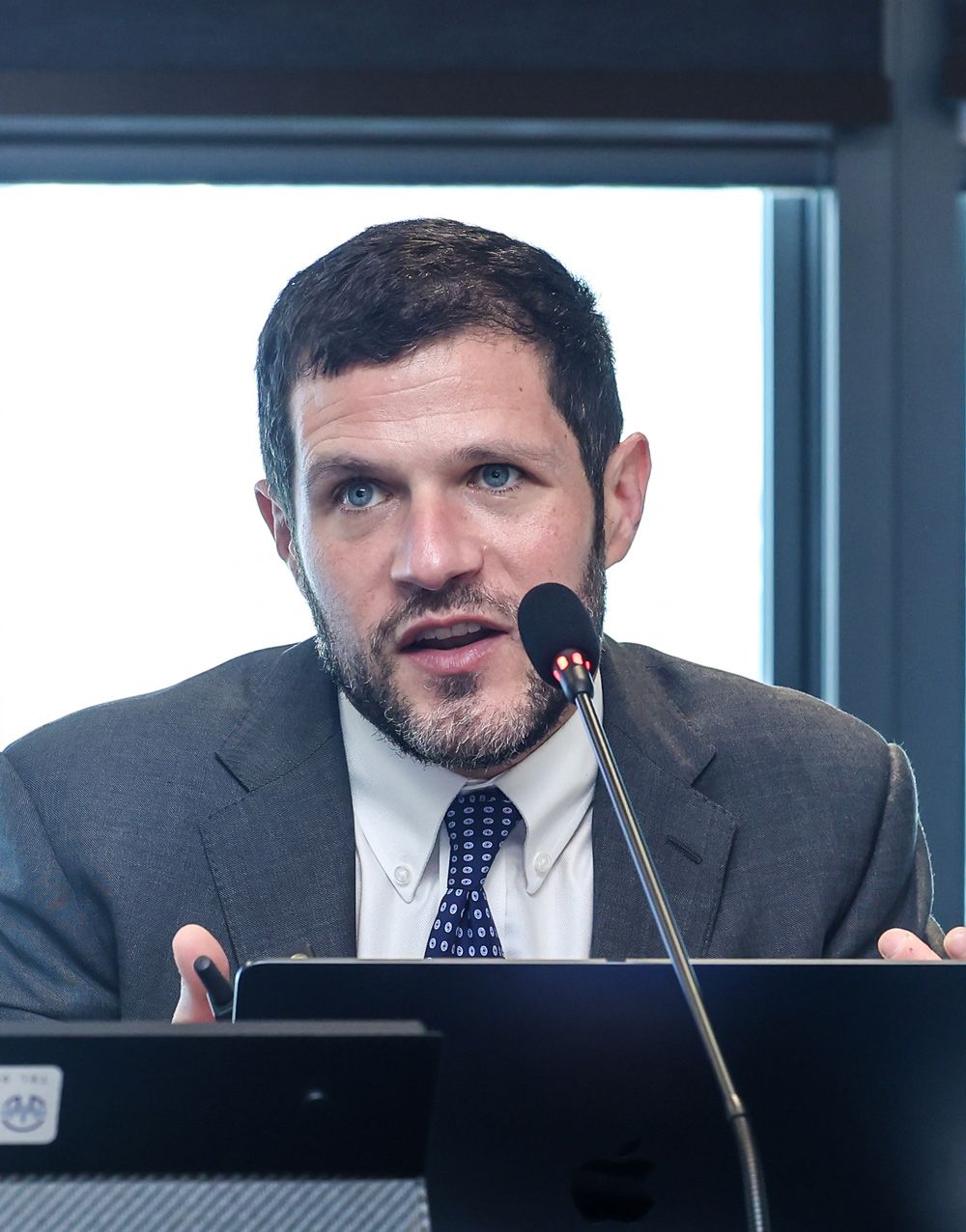Source: Taiwan-European Conference
The following are remarks by Dr. Shin-Yuan Lai, Minister of Taiwan's Mainland Affairs Council, at the Taiwan-European Conference.
Preface
Vice president Lin, Director Cheng, ladies and gentlemen, good morning.
I am delighted to be invited to join this conference to speak to you about the new situation of cross-strait relations. I am also extremely honored to join such an eminent group of experts to share views on this important topic. I will briefly sketch the new trends of development in cross-strait relations since the change of government on May 20 of this year.
Unlike other relationships in the international arena, cross-strait relations are extremely complex. On the one hand, the relations are marked by close and frequent interaction in economic, trade, social, cultural, educational and other spheres; on the other hand, military and political antagonism is also a constant irritant pulling the relations to the other direction. In a word, the situation in the Taiwan Strait has been marked by fluctuations between heightening and easing of tensions, making it a constant focus of attention in the international media.
The international community as a whole has long wished for reconciliation and alleviation of the tensions in the Taiwan Strait. It is in Taiwan’s best interests to preserve cross-strait peace and stability, to maintain advantages in economic development and to promote democratic values. Hence, we are striving very hard to create conditions so that reconciliation and peace can be realized. We are equally keen in opening new windows of opportunity for dialogue and communication with mainland China which had been deemed as adversary until recently. We are doing this not only for the sake of the two sides of the Taiwan Strait, but also for the common prosperity and development of the whole Asia-Pacific region.
A New Phase in Cross-Strait Relations
After the new administration took office in May this year, it immediately set the goal of reshaping the cross-strait relations upon their pre-existing foundations. Having weighed up the overall trend of changes in the domestic and international environments, the new government took the initiative in expressing goodwill toward the Mainland, while at the same time ascertaining how willing Beijing might be to respond with goodwill. In as little as less than a month, the institutionalized negotiation mechanism was resumed.
To help advance normalization of cross-strait relations, and to promote Taiwan’s economic development and global alignment, our government has taken a succession of steps in the past six months to loosen policy restrictions. These steps include, among others, allowing the Taiwan people to use the “Mini-Three-Links” to travel to and from the Mainland; making the renminbi convertible in Taiwan; relaxing the ceiling on the amount of investment in the Mainland by Taiwan’s listed companies; opening Taiwan’s stock market to investment by mainland’s Chinese qualified domestic institutional investors ( QDIIs); extending Mainland reporters’ right of coverage in Taiwan to central and regional media; and relaxing restrictions on visits to the Mainland by Taiwan’s local government chiefs.
It may be said that, since May 20 of this year, because of our initiative and goodwill, as well as Beijing’s positive response, cross-strait relations have broken through the deadlock of the preceding 10 years, and have entered into a new phase of benign interaction. The most important breakthrough has been the resumption of the institutionalized negotiation by the two governments across the Strait.
Significance of the Institutionalized Cross-Strait Negotiation since May 20
1.Manifesting principles of equality and mutual non-denial
Dialogue and negotiation are key benchmarks if the cross-strait relations are to proceed in a more normalized fashion. From May 20 of this year, governments on both sides of the Strait set out to resume the institutionalized negotiation channel that had been broken off for more than a decade. Within half a year, our Straits Exchange Foundation (SEF) and the Mainland’s Association for Relations Across the Taiwan Strait (ARATS) have already held two rounds of high-level talks, and consequently, six agreements have been signed.
On November 3, Mr. Chen Yun-lin, Chairman of the ARATS, visited Taiwan at the invitation of SEF Chairman Chiang Pin-kung. Talks were conducted between the two chairmen, and four agreements were successfully signed on matters directly concerning the livelihood and well-being of the Taiwan people. Outcome demonstrates that the two sides of the Taiwan Strait are conducting talks on a basis of equality under the principle of “mutual non-denial.”
2.Emboding a new model of dialogue and interaction on a basis of equality
The talks embarked on since May 20 have further consolidated the mechanism for institutionalized cross-strait negotiation. In the future, we will conduct high-level cross-strait talks approximately every six months. In addition to engaging in dialogue and reaching agreements on pertinent issues, we will also review the performance of the existing agreements that have been put into effect. We’ll also plan the agenda for the subsequent negotiations. In this manner, an institutionalized mechanism for bilateral talks is basically forged.
Observing from these two rounds of talks, we find the two sides have been able to greatly upgrade the level of interaction in the form of official capacity. The direct participation of officials in charge of cross-strait affairs and relevant government agencies is conductive to the solution of substantial issues . I would also like to stress that the talks that are being planned are either highly relevant to Taiwan’s economic development, or beneficial to the creation of an orderly exchange mechanism between the two sides, or concerning the welfare and interests of the Taiwanese people.
With regard to the political issues, domestic consensus has to be achieved first. This is a time-consuming process and cannot be reached in just one stroke.
In the next section, I’ll try to summarize the impact of the two rounds of talks on Taiwan and cross-strait economy.
Impacts of Cross-Strait Talks on Taiwan’s Economy
Mainland China’s rapid economic rise in recent years has already turned it into one of the main driving forces of global economic growth. However, it has also caused many structural shocks to the global economy. For example, its powerful magnetic effect attracting foreign investment has severely hampered neighboring countries’ ability to expand their FDI; its role as the “world factory” for manufacturing standardized goods has changed the global industrial chain; its soaring demand for oil and raw materials has contributed to the sharp increase in the prices of basic commodities.
But from another point of view, the extremely close economic and trade relations across the Taiwan Strait mean that the Mainland’s economic rise has had a greater impact on Taiwan than on any other country. In 2007, cross-strait trade amounted to US$130.2 billion, which accounted for 27.9% of our total foreign trade and made the Mainland our primary trade partner. Mainland China was our largest export market, accounting for 40.7% of our total exports, worth US$100.4 billion. And with cross-strait trade showing a balance of US$70.6 billion in Taiwan’s favor, mainland China was the largest source of our trade surplus. At the end of last year, our business sector’s cumulative investment in the Mainland had reached US$64.9 billion, or 55.4% of our total outward FDI. And last year the number of trips by travelers across the Taiwan Strait reached almost 5million.
These figures attest that, while the Mainland’s economic rise does pose a threat to Taiwan, it also offers opportunity. In fact, Taiwan’s already close economic relationship with the Mainland means that, in pursuing the policies of “deeply cultivating Taiwan while linking up with the world,” we cannot pull away from mainland China.
The two agreements signed during this year’s first “Chiang-Chen Talks,” concerning Mainland tourist visits to Taiwan and weekend passenger charter flights, and the four agreements signed at the second “Chiang-Chen Talks,” on air transport (including the establishment of a new flight path, cargo charter flights, and daily passenger charter flights), sea transport, postal service cooperation, and food safety, will all have actively positive effects in facilitating contacts between the people on the two sides of the Strait, promoting bilateral economic and trade exchanges, and strengthening food sanitation and safety.
Taking direct cross-strait air transport for example, the straightening of the flight path will shorten the flight time between Taoyuan and Shanghai from 2 hours and 24 minutes to 1 hour and 22 minutes, saving 62 minutes and 40~45% of fuel costs for each journey. This will translate into savings to travelers and airlines of at least NT$3 billion a year. After direct shipping goes into effect, vessels crossing the Taiwan Strait will no longer have to make a detour via Ishigaki or Hong Kong, reducing the time of each voyage by 16 to 27 hours, and reducing shipping costs by 15~30%. Adding in the saving of third territory visa charges, the cost of each voyage will be reduced by NT$300,000, enabling shippers to save at least NT$1.2 billion a year.
In addition to these savings of time and transportation costs, the signing of these agreements re-establishes Taiwan’s strategic position in the economies of Asia and even the Asia-Pacific region, raises Taiwan’s overall competitiveness, and bolsters connections between Taiwan and international markets. We expect that, after the implementation of direct air and sea transport, Taiwan will be able to attract more investment by transnational enterprises, and serve as a base of operations for access to the markets of mainland China and Southeast Asia.
Thus our government’s way of responding to the Mainland’s economic rise is to “minimize the threat and maximize the opportunity.” If we can actively tap into Taiwan’s advantages, and adjust our economic and trade policies to bolster the connections between Taiwan’s economy and global markets, Taiwan will be able to develop into the operating headquarters for Taiwanese businesses and an Asia-Pacific operations center for foreign businesses.
Therefore, the most pressing task for our government now is to first pursue the normalization of cross-strait economic and trade relations. But in so doing, we will make careful and thorough risk assessments, and will put in place the fullest and soundest accompanying measures as required, with Taiwan’s national interests and security as our paramount consideration. At the same time, we can not disregard any potential risks from the Mainland.
In the next stage, our government will place cross-strait financial cooperation at the top of the agenda for the third round of Chiang-Chen talks. This will cover discussion of establishing a cooperative mechanism for banking supervision, inking a memorandum on securities and futures supervision, and promoting cross-strait financial dealings. Other issues of economic and trade cooperation on the agenda will include a cross-strait investment protection agreement, avoidance of double taxation, a cross-strait economic and trade dispute resolution mechanism, cross-strait standards testing and certification cooperation, and cross-strait IPR protection. Other issues concerning aspects of law and order in cross-strait exchanges will be put on the agenda for subsequent talks.
Besides their beneficial economic effects, cross-strait talks likewise give rise to political effects, and this aspect is extremely complicated, calling for patient and careful handling.
The Impact of Cross-Strait Talks on the Cross-Strait Political Side
The successful holding of the two rounds of Chiang-Chen talks, promoting benign cross-strait interaction and the gradual build-up of mutual trust signify that the two sides have entered an epoch of dialogue in place of confrontation. We all saw how Chen Yun-lin’s visit to Taiwan triggered some political discord within our country. This is a problem of social psychology, related to the longstanding state of military and political confrontation between the two sides of the Strait. Because of the high degree of tension in cross-strait relations in the past, the current state of progress toward cross-strait reconciliation and thawing is generating co-existing feelings of hope and misgiving among our people.
Although various survey has shown that as high as 72 percent of respondents approve of institutionalized cross-strait consultation, I understand the worry expressed by some people that the foundations of democracy, freedom and human rights that Taiwan has taken such pains to establish over the past twenty years might be harmed by the development of cross-strait relations, and the fears of our national sovereignty and national dignity being harmed. I want to reaffirm that the government is certainly applying its efforts in the right direction, is absolutely insisting on Taiwan-centric identity autonomy and national sovereignty, and is taking strict action to prevent their being compromised. With the two rounds of institutionalized negotiations, both sides are gradually establishing mutual trust, and are also demonstrating willingness to take a positive stance on facing political reality. I believe that, as the two sides of the Strait build up mutual trust bit by bit, the mutual trust between the ruling and opposition parties in Taiwan can also be improved.
Here I would also like to remind the Mainland authorities that peace and development are the only right path to take for moving toward the constructive solution of cross-strait issues. President Ma’s advocacy of “no unification, no independence, and no use of force” is aimed at maintaining the status quo in the Taiwan Strait and preserving peace in the region. He also stressed that the two sides should hold the attitudes of “facing reality and pursing mutual non-denial”, so that the goal of “creating benefit for the people and maintaining cross-strait peace” can be achieved. I particularly want to point out that the suppression of Taiwan’s international space and military threat which have been imposed by Mainland China have to be stopped.
This year happens to be the 30th anniversary of Mainland China’s reform and opening up, and the opening of cross-strait contacts has reached its 20th year. Taiwan needs a stable and peaceful environment in order to put all efforts into carrying out its processes of domestic political reform, deepening internationalization, and pursuing stronger economic development and fairer social systems so that we can keep up with nations at the forefront of the modern world. The Mainland needs to continue to deepen its economic reforms, and should also pursue political reforms, as this is the only way to enable it to eliminate factors of instability, and to ensure a smooth course for its economic and social development. I believe that, on the basis of respecting the existing regional order and peace and stability in the Taiwan Strait, the two sides should both seize the opportunity to resolve their differences, and to enable the long-term stable progression of cross-strait relations.
Future Prospects
I often explain to people from all walks of life that cross-strait relations need to progress on a sound and sure footing, embodying the principles of “steps, order and pace”. Under the cognizance of equality, dignity and stability we hope to seek out common benefits in the interactive process. More importantly, we should respect the existence of the other. Mainland China cannot treat Taiwan as politically non-existent. They cannot treat us as a political or economic entity under their subordination. They cannot disrespect Taiwan’s rights as a member of the international community.
In this era of globalization, peace and development are not only a common objective among nations but also the highest goal of our cross-strait policy. They meet the greatest interest of the 23 million people on Taiwan. Our government’s hard work since May 20 of this year has already borne its first fruits. This is a known fact. Cross-strait relations are opening up step by step, and we need to have input from all sectors of the society and support from the international community.
Ladies and gentlemen, I end my remarks by wishing this conference every success and wishing you all the very best of health.
Thank you very much!








